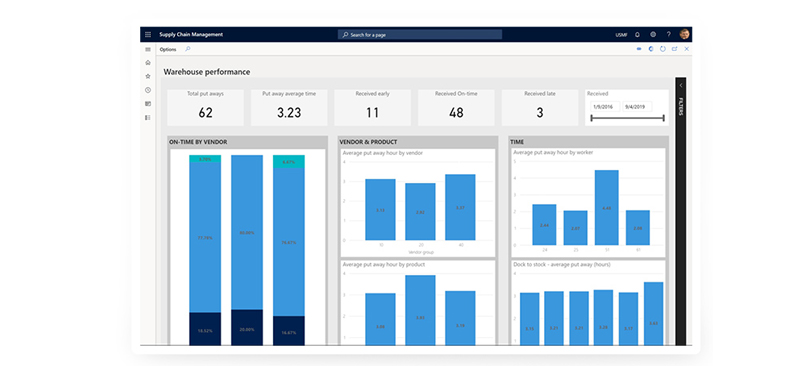Business Central: Streamlined Supply Chain
Optimize your supply chain with Business Central. Manage inventory, track orders, and gain real-time insights to improve efficiency and reduce costs.
Follow us for the latest updates, exciting offers, and behind-the-scenes glimpses. Connect with our community and be a part of the conversation.
Stay up-to-date with the Educational Newsletters, Case Studies, exclusive offers, and valuable insights by subscribing to our newsletters.
Subscribe Now
The Supply Chain Management module in Business Central is designed to optimize supply chain operations, improve efficiency, and enhance visibility across the supply chain. It provides businesses with the tools they need to manage their procurement, inventory, production, and distribution processes effectively, leading to improved supply chain performance and customer satisfaction.
Key Features:
Manages and centralizes product information, including specifications, variations, and related data.
Provides tools for tracking and managing inventory levels, including real-time visibility into stock levels, reorder points, and replenishment processes.
Streamlines the order-to-cash process, including order entry, fulfillment, and invoicing.
Supports manufacturing processes, including production planning, work order management, and shop floor control.
Includes features for process manufacturing, discrete manufacturing, and lean manufacturing.
Enables organizations to optimize their supply chain planning processes, including demand forecasting, material requirements planning (MRP), and distribution planning.
Manages and optimizes warehouse operations, including picking, packing, shipping, and warehouse layout optimization.
Optimizes transportation logistics, including route planning, carrier selection, and freight management.
Supports quality control processes, including inspections, testing, and non-conformance management.
Facilitates collaboration with vendors and suppliers, streamlining procurement processes and ensuring timely deliveries.
Manages and maintains physical assets, including equipment, machinery, and facilities.
Integrates with Internet of Things (IoT) devices to collect real-time data on equipment performance, product conditions, and other relevant metrics.
Provides analytics and reporting tools for supply chain performance analysis, allowing organizations to make data-driven decisions.
Adaptable to the needs of organizations of various sizes and industries, allowing for scalability and customization based on unique requirements.
Integrates seamlessly with other Dynamics 365 modules, such as Finance and Sales, creating a unified business management platform.
Utilizes predictive maintenance capabilities to optimize equipment reliability and minimize downtime.
Supports organizations with global operations, providing multi-language and multi-currency capabilities.
We believe that a personal conversation would be the best way to explore how our offerings can align with your specific needs and goals.
Book NowRequest a quote from our team of experts and discover how our tailored solutions & Services can drive growth and success for your organization.
Request A QuoteSome of services offered by us as Microsoft partners and service providers include:
Dynamics 365 Supply Chain Management offers several benefits to organizations seeking to optimize and streamline their supply chain processes. Here are key advantages and benefits associated with using Dynamics 365 Supply Chain Management:
Provides real-time visibility into the entire supply chain, allowing organizations to monitor and track processes from procurement to production, warehousing, and distribution.
Optimizes inventory levels by providing accurate and timely information on stock levels, demand forecasts, and reorder points.
Reduces excess inventory and carrying costs while minimizing stockouts.
Streamlines the order-to-cash process, improving order accuracy, fulfillment speed, and customer satisfaction.
Enables organizations to efficiently process and fulfill customer orders.
Supports various manufacturing modes, including process, discrete, and lean manufacturing, allowing organizations to choose the best fit for their operations.
Improves production planning, work order management, and shop floor control.
Facilitates demand forecasting, material requirements planning (MRP), and distribution planning to optimize supply chain planning processes.
Helps organizations align production and distribution with actual demand.
Enhances warehouse operations by optimizing picking, packing, and shipping processes.
Streamlines logistics and transportation management, improving route planning and carrier selection.
Facilitates collaboration with vendors and suppliers, improving communication and coordination in the procurement process.
Enhances procurement efficiency by automating processes such as purchase order creation and approval.
Supports quality control processes, including inspections, testing, and non-conformance management.
Ensures product quality and compliance with industry standards.